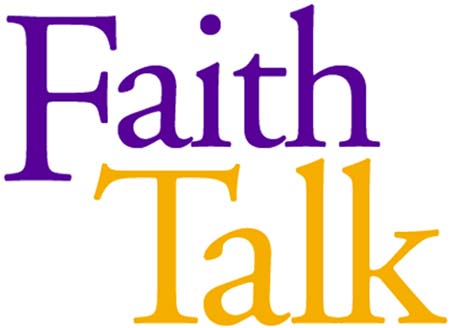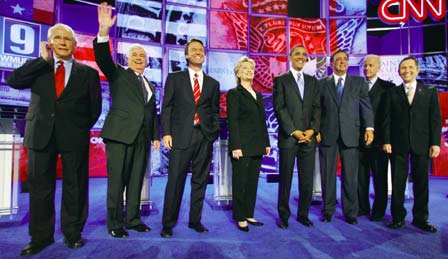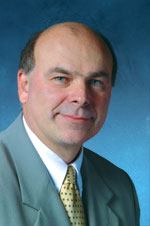Faith Talk
Lincoln E. Steed September/October 2007
Getting your Trinity Audio player ready...

Some journalistic wag has coined a term for the phenomenon of religion in this developing presidential face-off. It's called "God-talk." And there is lots of it. The candidates have, as they used to say, "gotten religion."
President George Bush seems to have started something back in the 2000 election when he nominated Jesus as his most influential figure, "Because He changed my heart." With it he staked out the role of political stand-in for the nation's religious conservatives. Pew Research Institute surveys show that he has largely retained their support. This in spite of some evidence that while his administration throws red meat to conservatives on many an occasion, it has denied them the full game and, according to White House insider David Kuo, laughed at them behind closed doors. In many ways this administration has been able to get credit for both talking the talk and walking the walk—even as we heard the harsh words on open mikes and saw the double standard on things like gay lifestyles.
Perhaps because of this, the electorate seems to be wanting something more spiritual this time around. Senator Clinton is about the only candidate willing to say that her religion is a private thing and that she was brought up to keep discussion of it out of the public eye. Of course she still feels obligated to give a very comprehensive history of her faith and the mentors who led her to Christ.
There are dangers in this new approach to presidential faith, however. For Hillary, it means the risk that she is perceived as inventing a faith narrative because it is required—indeed this is the danger for all Democrats. For Barack Obama the risk is that his deep faith will offend both camps of voters: "to the left are liberals uneasy with religious intrusions into politics; to the right, conservatives who have questioned his Christianity and denounced his ties to [an] Afro centric church." Christian Science Monitor.com.

So entrenched is this new assumption of Christian orthodoxy as a qualification for top office, that Mitt Romney, a Mormon, has had to fend off charges that his is not a Christian religion at all. Now if we dedicated this page to an internal debate on Christian orthodoxy, Mormonism might indeed fare badly—as might other "offshoot" or "new" faiths. Catholicism could cast itself as the "true" church, as several recent Vatican documents have done. And those Protestants who still remember the meaning of that term and the grounds of their faith, might point to some issues with Rome's claim. But we cannot bring this into the secular state. It was well considered when the framers of the Constitution specified that there be "no religious test for public office."
Polls taken by Time magazine and reported in the July 23 issue show the voters' bias toward religion. Their survey shows that despite an expected apprehension about Islam in an era of Islamic fundamentalist violence, an Islamic candidate would have less negatives than an atheist one! (To the question of whether the candidate's faith or atheism "makes me less supportive" the results were: Fundamentalist Christian 29 percent, Mormon 30 percent, Muslim 46 percent, and Atheist 59 percent!!) Sounds like the public is making its own religious test here. That is troubling for a healthy separation of church and state. It probably reflects public adoption of the conservative mantra for the past several years, to the effect that if you do not agree with their moral agenda, you are not a Christian or a good American, and are thereby essentially aiding the terrorists. The lower negative for Islam than Atheism, while containing the seeds of a gratifying American tolerance, may also signal the curious envy of Islamic fundamentalism in right-wing American circles that author Dinesh D'Souza tries to analyze in his recent book. Whatever the dynamic proves to be, we are left with Religion Rampant for 08.
Even as I write this editorial my desk is flowing over with the latest periodicals and their front-page stories on the faith factor for candidates. My initial reaction is to smile. Politics have their utility of course, but the necessary hurly-burly of campaigning and governing always strikes me as somewhat antithetical to the life of the spirit. And the sight of candidates performing stations of the cross to get elected is as absurd as Miss Universe contestants breathlessly explaining how they want to work toward world peace and eradicating hunger. Our expectations must necessarily be low for substance in such a context. Maybe that's why the organizers, opting to keep the question, have seen fit to reinsert the swimsuit segment. That's not likely any time soon in the political arena. The emperor must keep his clothes on, and this time around they are woven of the stuff that only a child might question.
It is worth remembering that true faith is something we all need and, if honest, we must respect. That is why such a danger exists here. We know that true faith is such a rarity that Jesus could even wonder aloud if any would exist when He returns. Ironically faith without substance is a dead weight to a civil society. It leads to mass cynicism. To national self-righteousness. To the union of church and state and support of someone else's view of how to keep us all on their religious wavelength.
Of all the candidates' comments on religion, I like best what Governor Mike Huckabee is saying. At a June 6, 2007, Pew Forum event in Washington, D.C., the ex governor of Arkansas said, "I would consider it an extraordinary shallow faith that does not impact the way we think about other human beings and the way we respond to them." So, obviously, the faith, not the profession of a candidate matters. But put this way, as voters of a wide range of beliefs and non-beliefs should see it, what the governor is really underscoring as the necessary component of a faith profession is character.
A little later in that same Pew event, when asked his thoughts on the First Amendment, Mike Huckabee said " We make it really complicated, but it's pretty simple. Congress should make no law that prohibits or prefers one religion or another. . . To me that's really simple. It's not about people of faith being unable to participate in government; it's that government can't dictate to those who have faiths as to what they do and what they believe, as long as it does not infringe or endanger someone."
Quite well put, Governor, even if a little muted on the establishment effect of government spending for religion. But that is best saved for a later day—a day we discuss faith-based initiatives and the Supreme Court, perhaps. For now, we'll follow the yellow brick road, listen to tin men and lions, and try to keep clear on such terms as faith, religion, and character.


Lincoln E. Steed
Editor,
Liberty Magazine
Article Author: Lincoln E. Steed
Lincoln E. Steed is the editor of Liberty magazine, a 200,000 circulation religious liberty journal which is distributed to political leaders, judiciary, lawyers and other thought leaders in North America. He is additionally the host of the weekly 3ABN television show "The Liberty Insider," and the radio program "Lifequest Liberty."